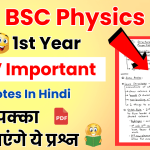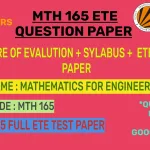Welcome to the comprehensive guide for B.Sc. 3rd-year Mathematics. This guide is designed to help you navigate through the key topics and concepts covered in the third year of your Bachelor of Science in Mathematics.
The curriculum may vary slightly depending on your university or board, but the fundamental concepts remain consistent across most programs in India.
Core Subjects Overview
The third year of B.Sc. Mathematics typically includes advanced topics in various branches of mathematics. Here, we’ll cover the essential subjects:
- Real Analysis
- Complex Analysis
- Abstract Algebra
- Linear Algebra
- Differential Equations
- Numerical Methods
- Topology
Real Analysis
Key Concepts
- Sequences and Series: Understanding convergence, divergence, and the tests for convergence.
- Functions of Real Variables: Limits, continuity, differentiability, and integrability.
- Metric Spaces: Open and closed sets, convergence in metric spaces, and completeness.
Important Theorems
- Bolzano-Weierstrass Theorem
- Heine-Borel Theorem
- Uniform Convergence Theorem
Complex Analysis
Key Concepts
- Complex Numbers: Algebra of complex numbers, polar form, and De Moivre’s Theorem.
- Analytic Functions: Cauchy-Riemann equations, harmonic functions.
- Complex Integration: Cauchy’s Theorem, Cauchy’s Integral Formula, and Residue Theorem.
Important Theorems
- Liouville’s Theorem
- Fundamental Theorem of Algebra
- Maximum Modulus Principle
Abstract Algebra
Key Concepts
- Groups: Subgroups, cyclic groups, permutation groups, and group homomorphisms.
- Rings and Fields: Ring homomorphisms, ideals, quotient rings, and field extensions.
- Vector Spaces: Subspaces, basis, dimension, and linear transformations.
Important Theorems
- Lagrange’s Theorem
- Sylow Theorems
- Fundamental Theorem of Finite Abelian Groups
Linear Algebra
Key Concepts
- Matrices and Determinants: Inverse of a matrix, rank, eigenvalues, and eigenvectors.
- Vector Spaces: Inner product spaces, orthogonalization, and diagonalization.
- Linear Transformations: Kernel, image, and matrix representation of linear transformations.
Important Theorems
- Cayley-Hamilton Theorem
- Spectral Theorem
- Jordan Canonical Form
Differential Equations
Key Concepts
- Ordinary Differential Equations (ODEs): First-order ODEs, higher-order linear ODEs, and systems of linear ODEs.
- Partial Differential Equations (PDEs): Classification of PDEs, method of separation of variables, and Fourier series.
Important Methods
- Laplace Transform
- Method of Characteristics
- Green’s Functions
Numerical Methods
Key Concepts
- Error Analysis: Types of errors, stability, and convergence.
- Numerical Solutions of Equations: Bisection method, Newton-Raphson method.
- Interpolation and Approximation: Lagrange and Newton’s interpolation, least squares approximation.
Important Algorithms
- Gauss-Seidel Method
- Runge-Kutta Methods
- Finite Difference Methods
Topology
Key Concepts
- Topological Spaces: Basis, subbasis, continuity, and homeomorphisms.
- Compactness and Connectedness: Compact spaces, Heine-Borel theorem, connected spaces.
- Separation Axioms: T0, T1, T2 (Hausdorff) spaces, and their properties.
Important Theorems
- Urysohn’s Lemma
- Tychonoff’s Theorem
- Baire Category Theorem
Study Tips
- Understand the Concepts: Focus on understanding the fundamental concepts rather than rote memorization.
- Practice Problems: Regularly solve problems from textbooks and previous years’ question papers.
- Study Groups: Join or form study groups to discuss and solve complex problems collaboratively.
- Consult References: Use standard textbooks and reference books recommended by your professors.
- Seek Help: Don’t hesitate to seek help from your professors or peers when you encounter difficult topics.
FAQ: B.Sc. 3rd Year Mathematics Notes
1. What topics are covered in B.Sc. 3rd-year Mathematics?
B.Sc. 3rd-year Mathematics typically includes advanced topics such as Real Analysis, Complex Analysis, Abstract Algebra, Linear Algebra, Differential Equations, Numerical Methods, and Topology.
2. Where can I find the syllabus for B.Sc. 3rd-year Mathematics?
The syllabus can be found on your university’s official website or by contacting your department. It’s also often included in the course materials provided at the beginning of the academic year.
3. What are the best textbooks for B.Sc. 3rd-year Mathematics?
Recommended textbooks vary by university, but commonly used ones include:
- “Principles of Mathematical Analysis” by Walter Rudin for Real Analysis.
- “Complex Variables and Applications” by James Ward Brown and Ruel V. Churchill for Complex Analysis.
- “Abstract Algebra” by David S. Dummit and Richard M. Foote.
- “Linear Algebra and Its Applications” by Gilbert Strang.
- “Differential Equations” by Shepley L. Ross.
- “Numerical Methods for Engineers” by Steven C. Chapra and Raymond P. Canale.
- “Topology” by James R. Munkres.
4. How can I effectively prepare for exams?
- Understand and review core concepts regularly.
- Solve past years’ question papers.
- Join study groups for collaborative learning.
- Use additional resources like reference books and online lectures.
- Seek clarification from professors and peers for difficult topics.
5. Are there any online resources for additional help?
Yes, several online resources can help:
- Khan Academy and Coursera for video lectures.
- MIT OpenCourseWare for free course materials.
- Websites like Paul’s Online Math Notes for extra practice problems.
6. How important is it to solve previous years’ question papers?
Solving previous years’ question papers is very important as it helps you understand the exam pattern, manage your time effectively, and identify important topics that are frequently tested.
7. Can I find notes or study materials online?
Yes, you can find notes and study materials on educational websites, university forums, and by joining online study groups. Some popular websites include:
- Academia.edu
- ResearchGate
- University-specific portals
8. How can I manage my time effectively while studying?
- Create a study schedule and stick to it.
- Break down your syllabus into manageable sections.
- Allocate time for revision and practice.
- Take regular breaks to avoid burnout.
9. What should I do if I don’t understand a topic?
- Revisit your lecture notes and textbooks.
- Watch online tutorials and lectures.
- Discuss the topic with classmates or study groups.
- Consult your professor during office hours.
10. How can I make my notes more effective?
- Write down key concepts and formulas clearly.
- Use bullet points for important points.
- Include examples and solved problems.
- Highlight or underline important information.
- Keep your notes organized and regularly updated.
11. What are the key differences between Real Analysis and Complex Analysis?
Real Analysis focuses on the properties of real numbers and real-valued functions, dealing with sequences, series, and real functions. Complex Analysis, on the other hand, deals with complex numbers and functions of a complex variable, emphasizing analytic functions and complex integration.
12. How does Abstract Algebra differ from Linear Algebra?
Abstract Algebra studies algebraic structures like groups, rings, and fields, focusing on their properties and relationships. Linear Algebra deals specifically with vector spaces, linear transformations, matrices, and systems of linear equations.
13. Why is Numerical Methods important?
Numerical Methods are crucial for approximating solutions to mathematical problems that cannot be solved analytically. They are widely used in engineering, physics, finance, and other fields to solve differential equations, integrals, and linear systems.
14. What is the significance of Topology in mathematics?
Topology studies properties of space that are preserved under continuous transformations. It’s fundamental in many areas of mathematics, including geometry and analysis, and has applications in physics, computer science, and more.
15. Can I pursue a career in mathematics after completing B.Sc. 3rd year?
Yes, a B.Sc. in Mathematics opens up various career opportunities in academia, research, finance, data analysis, cryptography, actuarial science, and more. You can also pursue higher studies like M.Sc. or Ph.D. in Mathematics or related fields
Latest Posts
- Step-by-step guide to download and apply for jee mains admit card 202
- Comprehensive 2025 government holidays and recruitment details for job seekers
- JEE Mains Admit Card 2025: Your Step-by-Step Guide to Downloading the Hall Ticket
- Everything You Need to Know About 2025 Government Holidays Recruitment
- Comprehensive Guide to rrb d group recruitment 2025 – Eligibility, Vacancies, and Application
- Detailed guide to nps trust recruitment 2025 vacancies, eligibility and apply process
- Comprehensive guide to hpcl recruitment 2025 notification, vacancies, and application process
- ignou bed admission 2025 complete recruitment guide with eligibility and process
- Comprehensive Guide to Indian Army Agniveer Recruitment 2025 Notification and Jobs
- Everything You Must Know About CBSE Board Exams 2025 Changes & New Rules






